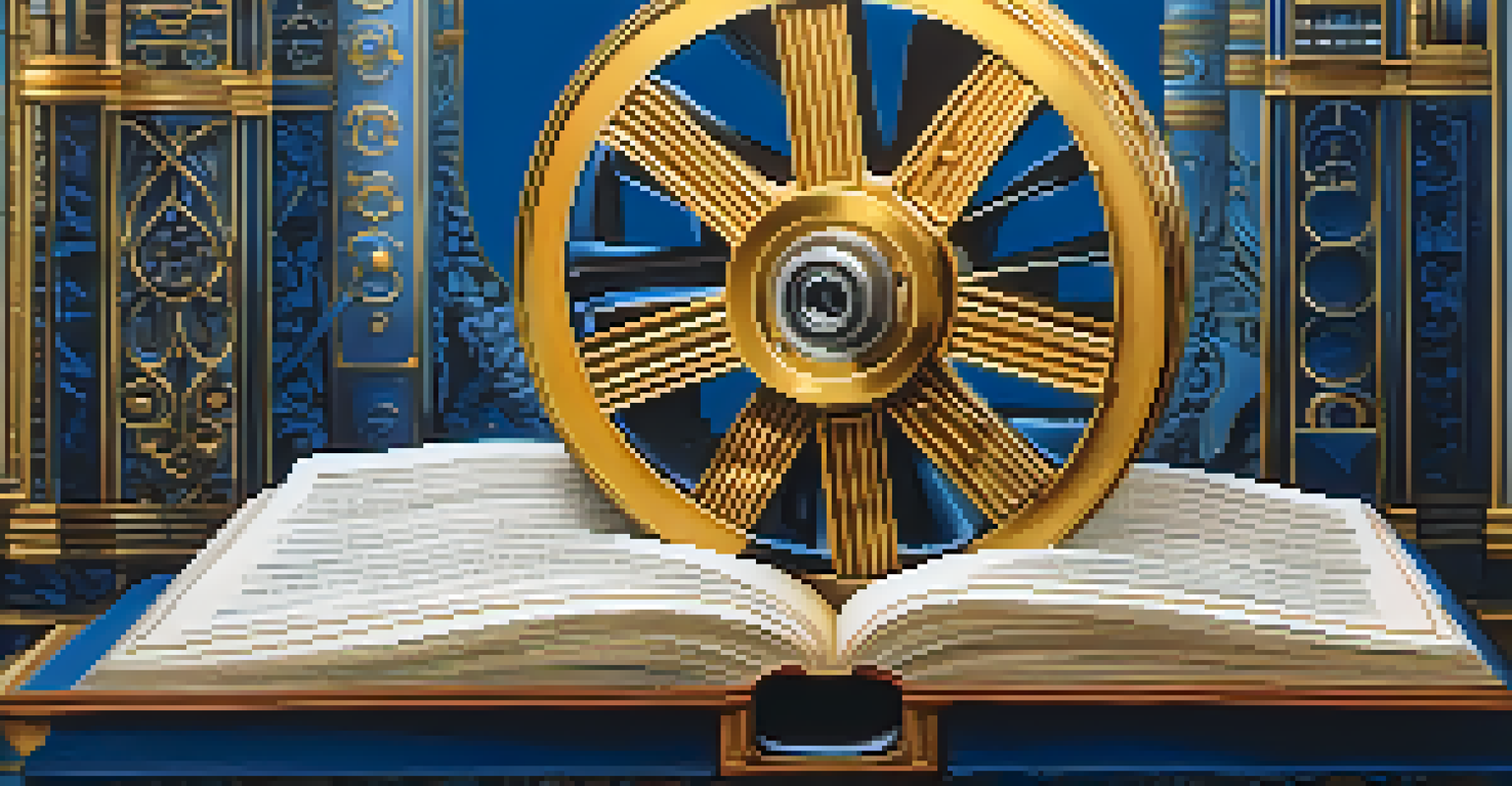How Hollywood Shapes Global Literature Trends and Styles

The Interplay Between Film and Literature
Hollywood and literature have a long-standing relationship, often influencing each other in profound ways. When a blockbuster film adapts a novel, it can breathe new life into the original work, sparking renewed interest among readers. This synergy not only helps the book sales but also shapes the narrative styles and themes that writers pursue in their own works.
There is no greater agony than bearing an untold story inside you.
For instance, the success of film adaptations like 'The Lord of the Rings' not only brought J.R.R. Tolkien's epic into the limelight but also inspired a wave of high-fantasy literature. Writers began exploring similar mythic narratives, leading to a surge in fantasy novels that echoed the cinematic grandeur of such films. This demonstrates how film can shape literary trends, encouraging writers to tap into popular themes.
Moreover, the global reach of Hollywood ensures that these trends aren't confined to American literature alone. Writers from different backgrounds often blend their cultural narratives with Hollywood-inspired themes, leading to unique literary creations. This cross-pollination not only diversifies literature but also enriches the storytelling landscape worldwide.
Cultural Narratives and Hollywood's Influence
Hollywood has a unique ability to shape cultural narratives that resonate on a global scale. The stories told through films often reflect societal values, struggles, and aspirations, guiding writers on what themes might appeal to audiences. As a result, literature often mirrors these cinematic narratives, creating a dialogue between the two mediums.

Take, for example, the trend of dystopian novels that gained traction following films like 'The Hunger Games.' These stories often explore themes of survival, government control, and social injustice, reflecting contemporary fears and anxieties. The popularity of such narratives in film can lead to an increase in similar topics in literature, as authors seek to engage with readers' interests and concerns.
Film Boosts Literary Trends
Hollywood adaptations often revitalize interest in novels, inspiring writers to explore similar themes and styles.
This cultural interplay can also lead to the emergence of new genres and styles, as writers experiment with blending traditional storytelling with modern cinematic techniques. As Hollywood continues to evolve and embrace diverse voices, literature too is likely to reflect this shift, creating a rich tapestry of narratives that resonate with audiences worldwide.
The Rise of Adaptations and Their Impact
Adaptations play a significant role in the relationship between Hollywood and literature. When a book is adapted into a film, it often introduces the original story to a wider audience, leading to increased readership. This, in turn, can create a cycle where successful adaptations motivate writers to produce content that is more 'adaptable' to screen.
Books are a uniquely portable magic.
For instance, the trend of creating series based on novels, such as 'Game of Thrones,' has led authors to develop more intricate plots and character arcs, knowing that these elements will attract adaptation interest. As a result, writers are increasingly crafting stories that lend themselves to visual storytelling, enhancing the narrative techniques they employ.
However, this emphasis on marketability can also pressure writers to conform to certain styles or formulas that are favorable for adaptation. While this can lead to innovative storytelling, it may also risk diluting original voices in literature, making it crucial for authors to balance commercial appeal with authentic expression.
Influence of Global Cinema on Literature
While Hollywood is a dominant force, global cinema also shapes literary trends in significant ways. Films from different cultures often introduce unique storytelling techniques and themes that resonate with international audiences. This influence encourages writers to explore diverse narratives, leading to a more inclusive literary landscape.
For example, the rise of South Korean cinema, particularly with films like 'Parasite,' has sparked interest in socio-political narratives that emphasize class struggles. This trend has inspired authors worldwide to delve into similar themes, leading to a resurgence of literature that challenges societal norms. Such cross-cultural influences enrich the storytelling framework available to writers.
Global Cinema Shapes Narratives
International films introduce unique storytelling techniques, encouraging authors to create diverse and inclusive literature.
As writers draw inspiration from global cinema, they not only diversify their works but also create opportunities for cultural exchange. This blend of influences fosters a deeper understanding of different perspectives, ultimately enhancing the richness of global literature.
The Role of Streaming Services in Literature Trends
The advent of streaming services has transformed how stories are consumed, subsequently impacting literature trends. With platforms like Netflix and Amazon Prime investing in original content, there’s a growing demand for compelling narratives that can translate well across mediums. This trend encourages authors to write stories that are not only captivating on the page but also have the potential for adaptation.
For instance, the popularity of serialized storytelling in streaming shows has influenced authors to craft books that mimic this episodic structure. By creating cliffhangers and intricate plotlines, writers can engage readers in a way that feels similar to binge-watching a series. This shift reflects an evolving understanding of narrative pacing and audience engagement.
Moreover, the accessibility of streaming platforms allows for niche stories to find an audience, which can lead to a broader acceptance of diverse genres in literature. As audiences become more receptive to varied narratives, authors are encouraged to explore unique themes and styles, ultimately enriching the literary landscape.
Celebrity Authors and the Impact of Fame
The rise of celebrity authors has also influenced literary trends, often blurring the lines between literature and celebrity culture. When a well-known figure pens a book, it generates significant media buzz, drawing readers who might not typically engage with literature. This phenomenon can lead to increased interest in certain genres or styles, as readers seek to explore works associated with their favorite personalities.
For instance, memoirs by celebrities often become bestsellers, prompting other authors to adopt a similar approach to storytelling. This trend encourages writers to share personal narratives, often incorporating elements of their lives into fiction. As a result, the lines between autobiography and fiction can become fluid, creating new styles that resonate with readers.
Streaming Services Influence Writing
The rise of streaming platforms prompts authors to develop captivating, episodic narratives that resonate with modern audiences.
However, this trend also raises questions about authenticity and the value of literary merit versus celebrity status. As writers navigate this landscape, they must find a balance between leveraging their platform and staying true to their craft, ensuring that literature remains a space for diverse voices and experiences.
The Future of Literature in a Hollywood World
As Hollywood continues to influence global literature, the future of storytelling looks vibrant and diverse. Writers are increasingly exploring unconventional narratives that reflect the complexities of contemporary life, often inspired by cinematic storytelling techniques. This evolution suggests that literature will continue to adapt and thrive alongside film.
Moreover, as audiences demand more authentic representations of their experiences, writers are likely to respond with narratives that reflect a broader spectrum of voices and cultures. This shift presents an exciting opportunity for literature to grow and evolve, embracing new styles and themes that resonate with global audiences.

Ultimately, the interplay between Hollywood and literature is a dynamic relationship that fosters creativity and innovation. As both mediums continue to influence each other, we can expect a rich tapestry of stories that challenge conventions and celebrate diverse narratives for years to come.